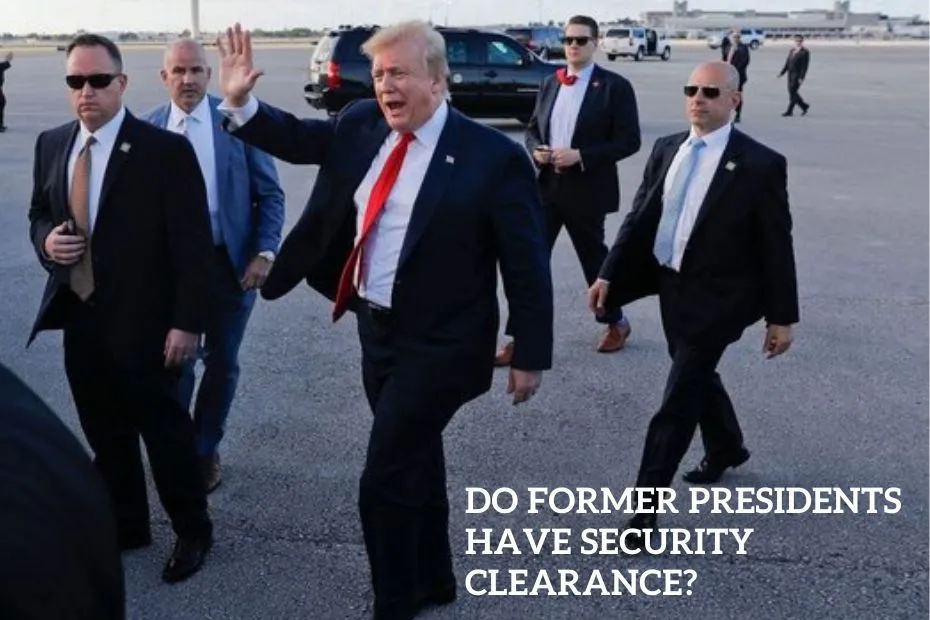The question of whether former presidents should retain security clearance has recently come under scrutiny. While the practice has been a long-standing tradition, concerns about potential misuse of sensitive information have led to a reevaluation.
Traditionally, former presidents have been granted access to certain classified information. This is done as a courtesy and is usually at the discretion of the sitting president. The rationale behind this practice includes consultation on various issues and briefings for overseas travel.
“The tradition of granting former presidents access to classified information is rooted in their unique experience and potential contributions to ongoing policy,” says Sarah Williams, a political historian.
Former Presidents of the United States do not automatically retain security clearance once they leave office. Security clearances are typically granted based on a “need to know” basis, and former Presidents generally do not have an official need to know classified information once they are out of office.
“The question isn’t just about tradition; it’s about national security. We need to weigh the risks carefully,” comments Robert Johnson, a former CIA officer.
However, it is customary for sitting Presidents to consult with their predecessors on various matters, and in such cases, a former President may be briefed on classified information relevant to the discussion at hand. The decision to share classified information with a former President is generally at the discretion of the current President and is usually done on an ad hoc basis.
Legally, former presidents are not subject to the same security clearance investigations as other government officials. Their access to classified information is more a matter of courtesy than a legal requirement. Security policy, including clearance eligibility, is often determined by executive orders from the sitting president.
“The legal framework provides a lot of leeway for the sitting president to decide on this matter,” notes Emily Davis, a legal expert on national security.
Additionally, former Presidents have access to their own Presidential Libraries, which may contain classified or sensitive material. However, this access is governed by strict protocols and does not equate to a formal security clearance.
As the 2024 election approaches, the topic of security clearances for former presidents could become a point of public interest, especially if candidates have complex financial ties or past behaviors that raise concerns.
“The 2024 election could very well bring this issue to the forefront, making it a subject of public debate and scrutiny,” says Mark Thompson, a political analyst.
Interesting Facts about Security Clearance for Former Presidents
1: No Automatic Revocation
Unlike other government officials who may have their security clearance revoked upon leaving their positions, former presidents don’t automatically lose their clearance. It remains unless explicitly revoked by the sitting president.
2: Briefings Can Be Tailored
The intelligence briefings given to former presidents can be tailored to their interests and expertise. For example, a former president with a strong background in foreign policy might receive more detailed briefings on international affairs.
3: Not All Presidents Use It
Interestingly, not all former presidents take advantage of their security clearance. Some choose to distance themselves from governmental affairs after leaving office, while others remain more involved.
4: No Oversight Committee
There is no formal oversight committee that monitors what former presidents do with the classified information they access. This is largely based on the trust and integrity associated with the office they once held.
5: Historical Precedent
The practice of giving former presidents access to classified information dates back several decades but became more formalized during the Cold War when the insights of former leaders were considered valuable for national security.
6: Limited Access for Spouses
While former First Ladies and First Gentlemen may receive briefings, their access to classified information is generally more restricted compared to the former presidents themselves.
7: No Legal Requirement to Consult
Although former presidents often have access to current intelligence, there is no legal requirement for the sitting president to consult with them on any matters, classified or otherwise.
8: Subject to Change
The policies surrounding security clearance for former presidents are not set in stone and can be changed by executive orders, as seen in recent years when the topic has become more contentious.
Frequently Asked Questions
Do all former presidents automatically retain security clearance?
No, retaining security clearance is not automatic for former presidents. It is generally at the discretion of the sitting president and can be revoked.
What kind of classified information can former presidents access?
The level of classified information that a former president can access varies and can be tailored to their interests and expertise. However, they generally do not have unrestricted access to all classified information.
Can a former president’s security clearance be revoked?
Yes, a former president’s security clearance can be revoked by the sitting president for various reasons, including national security concerns.
Do former First Ladies or First Gentlemen also have security clearance?
While former First Ladies and First Gentlemen may receive briefings, their access to classified information is generally more restricted compared to the former presidents themselves.
Is there an oversight committee for former presidents with security clearance?
No, there is no formal oversight committee that monitors what former presidents do with the classified information they access.
How long has the practice of granting security clearance to former presidents been in place?
The practice dates back several decades but became more formalized during the Cold War era.
Can former presidents consult on current governmental affairs using their security clearance?
While they can technically be consulted, there is no legal requirement for the sitting president to consult with former presidents on any matters, classified or otherwise.
In summary, The practice of granting former presidents access to classified information is steeped in tradition but is now being questioned due to various concerns. As we move closer to the 2024 election, this issue is likely to gain more attention, requiring a balanced approach that considers both tradition and national security.
